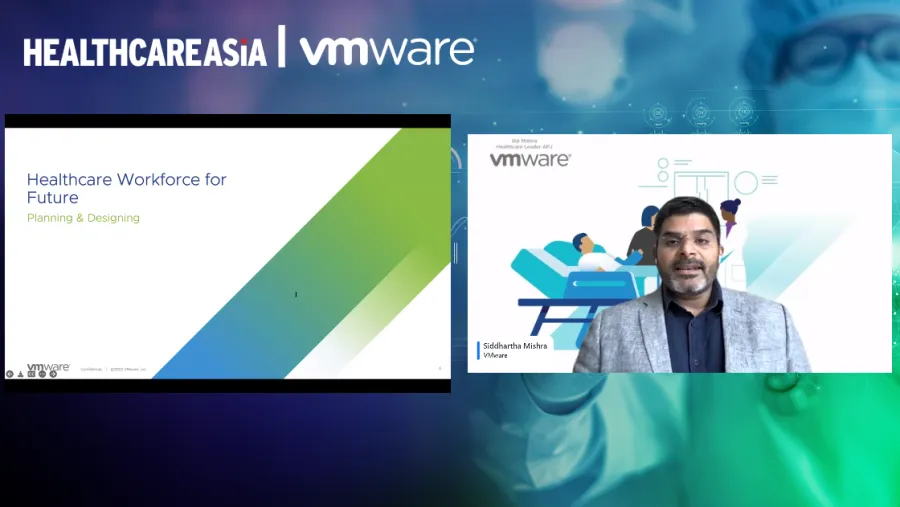
Future of healthcare needs to balance technology, human touch
The digitisation of the healthcare industry opens the door for a hybrid setup, maximising outcomes in a limiting environment.
From the latest innovations in operations to advancements in the management of healthcare facilities, digital transformation has evidently penetrated the healthcare sector. Today’s healthcare landscape has become more efficient and future-ready, despite the challenges in ensuring a more personalised patient experience and smarter use of data.
Given the immense amount of data produced from hospitals and healthcare services providers, organisations are now tasked to improve on their digitalisation journey in order to have a more modern cloud infrastructure. Their tools are also expected to have strong data security and the ability to support critical work.
VMware, in partnership with Healthcare Asia, hosted the “Future of Work 4.0 in Hospitals” webinar event to discuss the future of the healthcare sector and smart hospitals, as well as how to navigate the challenges in transforming the healthcare industry to digital.
The webinar also discussed solutions and strategies that healthcare organisations can leverage to help them with their digitalisation journey.
For VMware Director - Healthcare for Asia Pacific and Japan Siddhartha Mishra, the massive change that is happening within the healthcare industry because of digitisation and automation is going to bring an influx of skills and requirements. He believes these changes' impact on the existing healthcare workforce is significant.
“Organisations will need to manage the transition of current employees to potentially new and different ways of working. They will require future professionals to work increasingly in multidisciplinary teams, whilst [the] healthcare system will need to balance benefits of technology and artificial intelligence, alongside the ever-present need for human touch,” he said.
Siddhartha acknowledged that the total global demand for healthcare workers has always outpaced the supply, with shortages varying between manageable to stop levels based on the country's socioeconomic status. This has become more apparent with the blows brought by the COVID-19 pandemic to the industry.
Moreover, he mentioned that the digitisation of the health system and implementation of the Connected Care blueprint, in a localised manner, will shape a new way of doing their job.
“It will be a hybrid format, comprising physical and digital care of patients in varied proportions to maximise health outcomes. Technology integrations with clinical services and products will create new types of jobs such as inventing and handling public goods or medical products using a combination of biology and computer science,” he said.
Siddhartha noted that organisations realise the impact that artificial intelligence will have in healthcare organisations, especially with the need to onboard people with new skill sets, parameters to define and deliver their job, as well as how to provide credentials and privileges for them to do their work.
“Things like productivity need to be always measured for these people so that we can add more to the patient care and to the outcomes,” he said.
When asked during the panel discussion about the challenges that healthcare organisations face, Mishra pointed out that the key concerns at this point in time are cybersecurity and risks, which he deemed as some of the ‘interesting elements’ for healthcare workforce management.
“Most of these hospitals, the doctors, nurses and paraclinical users are moving out of the hospital and [are] still trying to provide patient care management. And if we are able to sum it up and provide a digital platform, and help them be secure from cyberattacks, create a cyber defence mechanism, it will be very well done for the healthcare institutions,” he said.
Pun Hlaing Hospitals Interim Chief Technology Officer Dr Sitt Paing, meanwhile, acknowledged the issue of lack of skilled professionals in the healthcare industry as a key issue, adding that it is difficult for developing countries to match the needed numbers. This is more apparent with the less healthcare spending in these countries.
He mentioned that there are “buckets of things” that need to be considered from a security infrastructure, application, interface, and human resource standpoint.
At the same time, IHH Healthcare Malaysia Deputy Head of IT Dr Arup Mukherjee echoed the other speakers’ sentiments. He emphasised that the lack of skills in hospitals is much more in-depth in single-facility hospitals compared to those running multi-facility hospitals. He noted, however, that there are still challenges and differences in the needs and processes of multi-facility hospitals since the needs are geographical.
Mukherjee said that whilst the skills or the resources may be available, the pigment to the right resource and the right skill is where the challenge comes in.
Meanwhile, VMware Senior Director, End User Computing Asia Pacific and Japan Jai Sahney mentioned that whilst some populations are not yet the most tech-friendly, they would just have to look back to the amount of advancements and improvements made during the past two years. He believes that these advancements would not have happened if not for the pandemic.
“There are places and times where innovation is required. This would give companies flexibility, start innovative teams, and empower them to make decisions that are important,” Sahney said.
He noted that the factors that supported the healthcare industry in the past two and a half years have laid the foundation for the industry and are expected to be carried moving forward.


















 Advertise
Advertise


